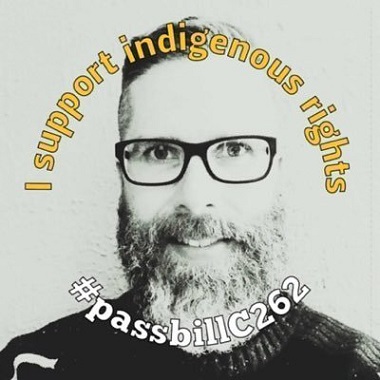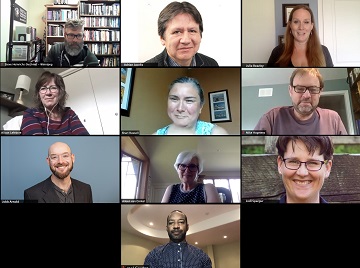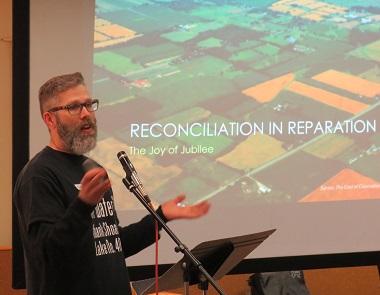
Steve Heinrichs is very committed to Indigenous rights; image from his Twitter page.
It would be a grievous shame if we (Canada) lost this moment – this opportunity to face and redress our own founding sins – to reconcile and reset for the possibility of “relations based in justice.”
There are some significant signs of hope.
Imagine evangelicals across Canada walking in costly solidarity with Indigenous peoples/nations to pursue “relations based in justice!”
Earlier this month, at the North America Institute for Indigenous Theological Studies (NAIITS) Indigenous Learning Community Symposium, representatives of the Evangelical Fellowship of Canada (EFC) made an amazing commitment to pursue this dream – a dream that Elijah Harper had originally put before us in the 1995 Sacred Assembly, a dream that we said “Yes” to some 25 years ago.
Below is the text of the sacred commitment. Please pray for the many – including me – who will be working at this. Words without flesh, we know, are empty and harmful. We want to embody this:

The EFC’s Indigenous Relations Working Group. Steve Heinrichs top left; Vancouver resident Jodi Spargur bottom right.
The Evangelical Fellowship of Canada is committed to working in collaboration with its Indigenous-Settler Relations Working Group to prompt conversation and action amongst its affiliates in relation to the following:
- Recommitment to the [1995] Reconciliation Proclamation by
- Circulating the Proclamation to key leaders in EFC circles
- Re-introducing (or in many cases, introducing for the first time) the Proclamation to the EFC affiliates
- Instituting an annual re-membering ceremony and training (as to what it means) among EFC leadership and constituency representatives
- Building awareness around Indigenous and colonial history (cf. TRC Calls to Action, #59)
- Initiate an awareness campaign/educational effort to share the good news of this Proclamation with constituencies. Reconnect with key partners and crafters of the Proclamation to pray and discern next steps
- The Truth and Reconciliation Commission’s Call to Action #49, repudiation of the Doctrine of Discovery and other legal fictions that claim jurisdiction over Indigenous lands and peoples
- Review existing resources developed by church bodies and/or create a short study resource for EFC affiliates to articulate its significance and implications for engagement.
-

Julia Beazley, director of public policy for the EFC, was a presenter at the NAIITS Symposium.
The Truth and Reconciliation Commission’s Call to Action #48, the adoption of the United Nations Declaration on the Rights of Indigenous Peoples (UNDRIP) and its meaning and implications for evangelical church communities
- An unsettling of evangelical theology resulting in evangelical thought and practice in Canada that
- renounces white supremacy
- renounces concepts used to justify European sovereignty over Indigenous lands and peoples
- proclaims that justice in human relationships is integral to God’s plan for restoration and affirms God’s preferential option for the poor and oppressed
- repudiates the idea of being neutral on issues of Indigenous justice, but commits to the struggle of being with those who are oppressed and fighting non-violently against the idols of our day as we pursue collective peace
- proclaims that Jesus is found amongst the most vulnerable and persecuted
- Learning from partner ecumenical bodies that are leading the way in Indigenous justice, such as KAIROS, supporting their advocacy efforts as appropriate
- Develop a theology of stewardship of land and creation and how that impacts our relationships to lands and waters and how we might stand with the Indigenous communities that protect them
- Establish a review and accountability mechanism to measure and evaluate progress on the action items listed above. This will include sharing our commitment with the National Centre for Truth and Reconciliation (Winnipeg, MB), and submitting annual updates

Steve Heinrichs led a supportive group through ‘The Cost of Colonialism, the Joy of Jubilee’ in Vancouver.
This article first appeared on Clarion Journal and is re-posted by permission.
Steve Heinrichs was part of the EFC working group that helped bring this about, and there were a number of EFC staff both on that group and at NAIITS. One member of the team is from Vancouver – Jodi Spargur of Healing at the Wounded Place.
The June 16 EFC Update stated:
From June 4 – 6, EFC staff participated in the 2020 virtual NAIITS Symposium. During the symposium, the EFC’s Indigenous Settler Relations Working Group presented a paper, Stewarding Sacred Seeds, which will be published in Journal of NAIITS: An Indigenous Learning Community.
In the paper, the Working Group looks back at the history of the EFC’s engagement in reconciliation with Indigenous peoples and recommends a number of actions to be taken by the EFC in pursuit of reconciliation and right relationship between Indigenous and non-Indigenous peoples in Canada. For more information, visit the new Indigenous Relations page on the EFC’s website.
Heinrichs is Director of Indigenous-Settler Relations for Mennonite Church Canada, based in Winnipeg, Treaty 1 territory and homeland of the Red River Metis. He has edited several helpful resources, including Unsettling the Word, Wrongs to Rights and Buffalo Shout, Salmon Cry.
He spoke about settler colonialism when he visited Vancouver earlier this year; I wrote about it here.
